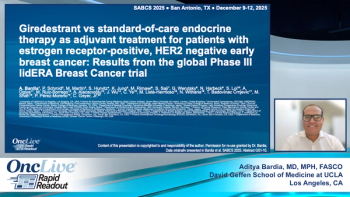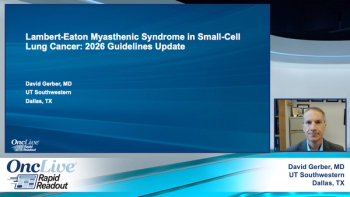
Rapid Readouts: Final Analysis of Phase 3 TITAN Trial
Scott T. Tagawa, MD, MS, FACP, reports on data presented at the 2021 American Society of Clinical Oncology (ASCO) Annual Meeting regarding health-related quality of life (HRQoL) and patient-reported outcomes (PROs) at the final analysis of TITAN, a phase 3 study evaluating apalutamide versus placebo in patients with metastatic castration-sensitive prostate cancer (mCSPC) who were receiving androgen deprivation therapy (ADT).
Scott T. Tagawa, MD, MS, FACP, discusses data from the following poster: “Health-related quality of life and patient-reported outcomes at final analysis of the TITAN study [
- The objective of this presentation was to provide the HRQoL and PROs obtained from the final analysis of the TITAN study [
NCT02489318 ]. - TITAN was a phase 3, randomized, double-blind, placebo-controlled, multinational trial that enrolled patients with metastatic castration-sensitive (hormone-sensitive) prostate cancer (eg, were not receiving ADT at the time of disease progression and randomization).
- Analyses of interim data obtained from the TITAN study have been published previously (
Agarwal et al, J Urol, 2021 ;Uemura et al, BMC Urol, 2020 ;Agarwal et al, Lancet Oncol, 2019 ; andChi et al, N Engl J Med, 2019 ) - Patients enrolled in the TITAN trial were randomized 1:1 to receive apalutamide (240 mg) or placebo, administered orally once daily. All patients were placed on continuous ADT at the time of randomization on top of their assigned interventional agent as well.
- The primary end points of TITAN were radiographic progression free survival and overall survival. In addition, PROs for HRQoL were assessed throughout the trial using the Brief Pain Inventory-Short Form (BPI-SF), Brief Fatigue Inventory (BFI), and Functional Assessment of Cancer Therapy-Prostate (FACT-P).
- The intent-to-treat population included 525 patients in the apalutamide arm and 527 patients in the placebo arm.
- After a median of nearly 4 years of follow-up (44.0 months), the addition of apalutamide to ADT significantly improved overall survival compared with placebo in patients with mCSPC without a significant worsening in HRQoL. PROs relating to pain, physical well-being, emotional well-being, social/family well-being, side effects bother, and fatigue (energy levels) remained stable throughout the trial and were similar across treatment arms.
- These findings suggest that therapy escalation using apalutamide on top of a traditional background of ADT offers survival benefit without a corresponding decline in HRQoL.




































